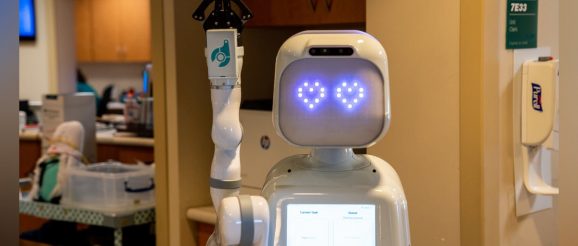ChristianaCare Piloting Robots to Support Nurses | Healthcare Innovation

Delaware-based health system ChristianaCare is piloting a collaborative robot — or “cobot”— that can make deliveries and perform other non-clinical tasks so that nurses and other clinical staff can spend more time caring for patients.
With a $1.5 million grant from the American Nurses Foundation, ChristianaCare will deploy five “Moxi” cobots at Christiana Hospital in Newark.
ChristinaCare cited research published in the Journal of Nursing Management that found that nurses spend up to 33 percent of their shifts on time-consuming but simple tasks such as dropping off lab specimens, collecting supplies or picking up medications from the pharmacy. Moxi can take over these time-consuming but simple tasks.
“Nurses need the time and space to deliver care and patient education at the top of their license,” said Ric Cumming, Ed.D., M.S.N., R.N., chief nurse executive and president of ChristianaCare HomeHealth, in a statement. “Moxi will be doing those hunting and gathering tasks such as getting equipment and supplies, which nurses are doing today but don’t need to be doing.”
Cobots are designed to share workspace and interact directly with people. In ChristianaCare’s initiative, the Moxi cobots will be integrated with the Cerner EHR and use artificial intelligence to proactively identify when nurses will need equipment, supplies, medications and lab tests.
Directly from the Cerner EHR, Moxi will be able to anticipate clinician and patient needs and perform tasks without human involvement. Examples could include:
• Delivering items to patients based on nurses’ order requests.
• Making rounds across units to deliver lab samples on collections completed in the electronic health record.
• Making just-in-time deliveries of pharmaceuticals not stocked on the floor.
• Prioritizing tasks based on the nursing workload in a unit, so that the busiest nurses will get help first.
“Connecting Moxi to the existing technology that clinicians use on a daily basis is key to making it easier to anticipate needs so clinicians can spend more time on patient care,” says Eva Karp, D.H.A., M..BA., R.N.-B.C., senior vice president, chief clinical and patient safety at Cerner, in a statement. “Moxi could make a real difference in a nurse’s day — alleviating burnout and staffing shortages, which have become especially prevalent since the pandemic.”
Incorporating the EHR into Moxi is part of the study funded by the American Nurses Foundation.
Using artificial intelligence, Moxi is mapping out Christiana Hospital through sensors and other machine-learning technology so that the cobots can ultimately navigate and work autonomously.
The Moxi cobots will be deployed to 11 inpatient units, partnering with more than 400 nurses. The American Nurses Foundation grant will enable ChristianaCare to evaluate the impact of cobots on nursing practice with the goal of scaling the technology, if successful.
“Moxi is not a replacement for a nurse or nursing position — or any position,” Cuming said. “It is an additional resource for nurses and their teams. With robotic technology, we are using resources wisely and effectively, creating more efficient workflows, reducing repetitive tasks and freeing up nurses’ time for the complex clinical work that they excel at doing.”
Moxi can work in 22-hour shifts and needs only two hours of charging time. It weighs about 300 pounds and can carry a total weight of 70 pounds. Other features include:
• Social intelligence: Moxi won’t bump into people or objects in hallways, waves when it sees someone new and happily poses for selfies.
• Mobile manipulation: Moxi can learn to use its robotic arm to operate existing automatic doors and elevator panels.
• Human-guided learning: The more Moxi is used, the more Moxi learns and adapts to the environment and specific ways of doing things.
ChristianaCare is one of 10 grant recipients from the American Nurses Foundation Reimagining Nursing (RN) Initiative. With the grant, ChristianaCare will conduct research on driving nursing outcomes through robotics.
“We have a transformative opportunity to generate new knowledge and to move the science forward around robotics in nursing and in health care,” said Susan Birkhoff, Ph.D., R.N., nurse scientist at ChristianaCare, in a statement. “Through research, we will study Moxi’s impact to nursing caregivers that will have broad implications for nursing practice, workforce and education,” she said.
